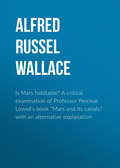
Alfred Russel Wallace
Travels on the Amazon
A jararáca, said to be one of the most deadly serpents in Brazil, was killed by a Negro in our garden. It was small, and not brightly coloured. A fine coral snake was also brought in; it was about a yard long, and beautifully marked with black, red, and yellow bands. Having, perhaps, had some experience of the lavish manner in which foreigners pay for such things, the man had the coolness to ask two milreis, or 4s. 6d. for it, so he had to throw it away, and got nothing. A penny or twopence is enough to give for such things, which are of no value to the natives; and though they will not search much after them for such a price, yet they will bring you all that come in their way when they know you will purchase them. Snakes were unpleasantly abundant at this time. I nearly trod on one about ten feet long, which rather startled me, and it, too, to judge by the rapid manner in which it glided away. I caught also a small Amphisbena under the coffee-trees in our garden. Though it is known to have no poison-fangs, the Negroes declared it was very dangerous, and that its bite could not be cured. It is commonly known as the two-headed snake, from the tail being blunt and the head scarcely visible; and they believe that if it is cut in two, and the two parts thrown some yards apart, they will come together again, and join into an entire animal.
Among the curious things we meet with in the woods are large heaps of earth and sand, sometimes by the roadside, and sometimes extending quite across the path, making the pedestrian ascend and descend (a pleasing variety in this flat country), and looking just as if some "Pará and Peru direct Railway Company" had commenced operations. These mounds are often thirty or forty feet long, by ten or fifteen wide, and about three or four feet high; but instead of being the work of a lot of railway labourers, we find it is all due to the industry of a native insect, the much-dreaded Saüba ant. This insect is of a light-red colour, about the size of our largest English species, the wood-ant, but with much more powerful jaws. It does great injury to young trees, and will sometimes strip them of their leaves in a single night. We often see, hurrying across the pathways, rows of small green leaves; these are the Saübas, each with a piece of leaf cut as smoothly as with scissors, and completely hiding the body from sight. The orange-tree is very subject to their attacks, and in our garden the young trees were each planted in the centre of a ring-shaped earthen vessel, which being filled with water completely surrounded the stem, preventing the ants from reaching it. Some places are so infested by them that it is useless planting anything. No means of destroying them are known, their numbers being so immense, as may readily be seen from the great quantities of earth they remove.
Many different kinds of wasps' and bees' nests are constantly met with; but we were rather shy of meddling with them. They are generally attached to the undersides of leaves, especially of the young Tucumá palm, which are broad, and offer a good shelter. Some are little flat domes, with a single small opening; others have the cells all exposed. Some have only two or three cells, others a great number. These are all of a delicate papery substance; but some have large cylindrical nests, on high trees, of a material like thick cardboard. Then again there are nests in hollow trees, and others among their roots in the earth, while the solitary species make little holes in the paths, and pierce the mud-walls of the houses, till they appear as if riddled with shot. Many of these insects sting very painfully; and some are so fierce, that on their nests being approached, they will fly out and attack the unwary passer-by. The larger kinds of wasps have very long stings, and can so greatly extend their bodies that we were often stung when endeavouring to secure them for our collections.
I also suffered a little from another of our insect enemies: the celebrated chigoe at length paid us a visit. I found a tender pimple on the side of my foot, which Isidora pronounced to be a "bicho do pé" or chigoe; so preferring to extract it myself, I set to work with a needle, but not being used to the operation, could not get it out entire. I then rubbed a little snuff in the wound, and afterwards felt no more of it. The insect is a minute flea, which burrows into the skin of the toes, where it grows into a large bag of eggs as big as a pea, the insect being just distinguishable as a black speck on one side of it. When it first enters it causes a slight irritation, and if found may then be easily extracted; but when it grows large it is very painful, and if neglected may produce a serious wound. With care and attention, however, this dreaded insect is not so annoying as the mosquito or our own domestic flea.
Having made arrangements for another and a longer visit to Magoary, we packed up our hammocks, nets, and boxes, and went on board a canoe which trades regularly to the mills, bringing the rice and timber, and taking whatever is required there. We left Pará about nine at night, when the tide served, and at five the next morning found the vessel lying at anchor, waiting for the flood. We were to proceed on to the mills in a montaria, or small Indian canoe, and as we were five with the Negroes who were to paddle, I felt rather nervous on finding that we sank the little boat to within two inches of the water's edge, and that a slight motion of any one of the party would be enough to swamp us altogether. However, there was no help for it, so off we went, but soon found that with its unusual load our boat leaked so much that we had to keep baling by turns with a calabash all the time. This was not very agreeable; but after a few miles we got used to it, and looked to the safe termination of our voyage as not altogether improbable.
The picturesque and novel appearance of the river's banks, as the sun rose, attracted all our attention. The stream, though but an insignificant tributary of the Amazon, was wider than the Thames. The banks were everywhere clothed with a dense forest. In places were numerous mangroves, their roots descending from the branches into the water, having a curious appearance; on some we saw the fruit germinating on the tree, sending out a shoot which would descend to the water, and form another root to the parent. Behind these rose large forest-trees, mingled with the Assai, Miriti, and other palms while passion-flowers and convolvuluses hung their festoons to the water's edge.
As we advanced the river became narrower, and about seven o'clock we landed, to stretch our cramped limbs, at a sitio, where there was a tree covered with the hanging nests of the yellow troupial, with numbers of the birds continually flying in and out. In an hour more we passed Larangeiras, a pretty spot, where there are a few huts, and the residence of Senhor C., the Commandante of the district. Further on we turned into a narrow igaripé, which wound about in the forest for a mile or two, when a sudden turn at length brought us the welcome sight of the mills. Here a hearty welcome from Mr. Leavens, and a good breakfast, quite compensated for our four hours' cramping in the montaria, and prepared us for an exploring expedition among the woods, paths, and lakes in the vicinity.
Our daily routine during our stay at the mills was as follows:—We rose at half-past five, when whoever pleased took a bath at the mill-stream. We then started, generally with our guns, into the forest, as early in the morning is the best time for shooting, and Mr. Leavens often accompanied us, to show us the best feeding-trees. At eight we returned to breakfast, and then again started off in search of insects and plants till dinner-time. After dinner we generally had another walk for an hour or two; and the rest of the evening was occupied in preparing and drying our captures, and in conversation. Sometimes we would start down the igaripé in the montaria, not returning till late in the afternoon; but it was in my early expeditions into the forest that I had my curiosity most gratified by the sight of many strange birds and other animals. Toucans and parrots were abundant, and the splendid blue and purple chatterers were also sometimes met with. Hummingbirds would dart by us, and disappear in the depths of the forest, and woodpeckers and creepers of various sizes and colours were running up the trunks and along the branches. The little red-headed and puff-throated manakins were also seen, and heard making a loud clapping noise with their wings which it seemed hardly possible for so small a bird to produce.
But to me the greatest treat was making my first acquaintance with the monkeys. One morning, when walking alone in the forest, I heard a rustling of the leaves and branches, as if a man were walking quickly among them, and expected every minute to see some Indian hunter make his appearance, when all at once the sounds appeared to be in the branches above, and turning up my eyes there, I saw a large monkey looking down at me, and seeming as much astonished as I was myself. I should have liked to have had a good look at him, but he thought it safer to retreat. The next day, being out with Mr. Leavens, near the same place, we heard a similar sound, and it was soon evident that a whole troop of monkeys were approaching. We therefore hid ourselves under some trees, and, with guns cocked, waited their coming. Presently we caught a glimpse of them skipping about among the trees, leaping from branch to branch, and passing from one tree to another with the greatest ease. At last one approached too near for its safety. Mr. Leavens fired, and it fell, the rest making off with all possible speed. The poor little animal was not quite dead, and its cries, its innocent-looking countenance, and delicate little hands were quite childlike. Having often heard how good monkey was, I took it home, and had it cut up and fried for breakfast: there was about as much of it as a fowl, and the meat something resembled rabbit, without any very peculiar or unpleasant flavour. Another new dish was the Cotia or Agouti, a little animal, something between a guinea-pig and a hare, but with longer legs. It is abundant, and considered good eating, but the meat is rather dry and tasteless.
One day we took the montaria and started to pay a visit to the Commandante at Larangeiras. The morning was beautiful; swallows and kingfishers flew before us, but the beautiful pavon (Eurypygia helias), which I most wanted, wisely kept out of the way. The banks of the igaripé were covered with a species of Inga, in flower, from which Mr. B. obtained some fine floral beetles. Among the roots of the mangroves numbers of "calling crabs" were running about; their one large claw held up, as if beckoning, having a very grotesque appearance. At Larangeiras the Commandante welcomed us with much politeness in his palace of posts and clay, and offered us wine and bananas. He then produced a large bean, very thick and hard, on breaking which, with a hammer, the whole interior was seen to be filled with a farinaceous yellow substance enveloping the seeds: it has a sweet taste, and is eaten by the Indians with much relish. On our expressing a wish to go into the forest, he kindly volunteered to accompany us. We soon reached a lofty forest-tree, under which lay many of the legumes, of which we collected some fine specimens. The old gentleman then took us along several paths, showing us the various trees, some useful as timber, others as "remedios" for all the ills of life. One tree, which is very plentiful, produces a substance intermediate between camphor and turpentine. It is called here white pitch, and is extensively collected, and when melted up with oil, is used for pitching boats. Its strong camphor-like odour might, perhaps, render it useful in some other way.
In the grounds around the house were a breadfruit-tree, some cotton-plants, and a fine castanha, or Brazil-nut tree, on which were several large fruits, and many nests of the yellow troupial, which seems to prefer the vicinity of houses. Finding in Mr. Edwards's book a mention of his having obtained some good shells from Larangeiras, we spoke to Senhor C. about them, when he immediately went to a box and produced two or three tolerable specimens; so we engaged his son, a boy of eleven or twelve, to get us a lot at a vintem (halfpenny) each, and send them to Mr. Leavens at the mill, which, however, he never did.
During our makeshift conversation, carried on with our very slender Portuguese vocabulary, Senhor C. would frequently ask us what such and such a word was in "Americano" (for so the English language is here called), and appeared highly amused at the absurd and incomprehensible terms used by us in ordinary conversation. Among other things we told him that we called "rapaz" in Americano "boy," which word (boi) in Portuguese means an ox. This was to him a complete climax of absurdity, and tickled him into roars of laughter, and he made us repeat it to him several times, that he might not forget so good a joke; even when we were pulling away into the middle of the stream, and waving our "adeos," his last words were, as loud as he could bawl, "O que se chama rapaz?" (What do you call rapaz?)
A day or two before we left the mills we had an opportunity of seeing the effects of the vampire's2 operations on a young horse Mr. Leavens had just purchased. The first morning after its arrival the poor animal presented a most pitiable appearance, large streams of clotted blood running down from several wounds on its back and sides. The appearance was, however, I daresay, worse than the reality, as the bats have the skill to bleed without giving pain, and it is quite possible the horse, like a patient under the influence of chloroform, may have known nothing of the matter. The danger is in the attacks being repeated every night till the loss of blood becomes serious. To prevent this, red peppers are usually rubbed on the parts wounded, and on all likely places; and this will partly check the sanguinivorous appetite of the bats, but not entirely, as in spite of this application the poor animal was again bitten the next night in fresh places.
Mr. Leavens is a native of Canada, and has been much engaged in the timber-trade of that country, and we had many conversations on the possibility of obtaining a good supply of timber from the Amazons. It seems somewhat extraordinary that the greater part of our timber should be brought from countries where the navigation is stopped nearly half the year by ice, and where the rivers are at all times obstructed by rapids and subject to storms, which render the bringing down the rafts a business of great danger; where, too, there is little variety of timber, and much of it of such poor quality as only to be used on account of its cheapness. On the other hand the valley of the Amazon and its countless tributary streams, offers a country where the rivers are open all the year, and are for hundreds and even thousands of miles unobstructed by rapids, and where violent storms at any season seldom occur. The banks of all these streams are clothed with virgin forests, containing timber-trees in inexhaustible quantities, and of such countless varieties that there seems no purpose for which wood is required but one of a fitting quality may be found. In particular, there is cedar, said to be so abundant in some localities, that it could, on account of the advantages before mentioned, be sent to England at a less price than even the Canada white pine. It is a wood which works nearly as easy as pine, has a fine aromatic odour, and is equal in appearance to common mahogany, and is therefore well adapted for doors and all internal finishings of houses; yet, owing to the want of a regular supply, the merchants here are obliged to have pine from the States to make their packing-cases. For centuries the woodman's axe has been the pioneer of civilisation in the gloomy forests of Canada, while the treasures of this great and fertile country are still unknown.
Mr. Leavens had been informed that plenty of cedar is to be found on the Tocantíns, the first great tributary of the Amazon from the south, and much wished to make a trip to examine it, and, if practicable, bring a raft of the timber down to Pará; in which case we agreed to go with him, for the purpose of investigating the natural history of that almost unknown district. We determined to start, if at all, in a few weeks; so having been nearly a fortnight at the mills, we returned to Pará on foot, sending our luggage and collections by the canoe.
Vessels had arrived from the States and from Rio. A law had been lately passed by the Imperial Government, which was expected to produce a very beneficial effect on the commerce and tranquillity of the province. It had hitherto been the custom to obtain almost all the recruits for the Brazilian army from this province. Indians, who came down the rivers with produce, were forcibly seized and carried off for soldiers. This was called voluntary enlistment, and had gone on for many years, till the fear of it kept the natives from coming down to Pará, and thus seriously checked the trade of the province. A law had now been passed (in consequence of the repeated complaints of the authorities here, frightening the Government with the prospect of another revolution), forbidding enlistment in the province of Pará for fifteen years; so we may now hope to be free from any disturbances which might have arisen from this cause.
Nothing impressed me more than the quiet and orderly state of the city and neighbourhood. No class of people carry knives or other weapons, and there is less noise, fighting, or drunkenness in the streets both day and night, than in any town in England of equal population. When it is remembered that the population is mostly uneducated, that it consists of slaves, Indians, Brazilians, Portuguese, and foreigners, and that rum is sold at every corner at about twopence per pint, it says much for the good-nature and pacific disposition of the people.
August 3rd.—We received a fresh inmate into our verandah in the person of a fine young boa constrictor. A man who had caught it in the forest left it for our inspection. It was tightly tied round the neck to a good-sized stick, which hindered the freedom of its movements, and appeared nearly to stop respiration. It was about ten feet long, and very large, being as thick as a man's thigh. Here it lay writhing about for two or three days, dragging its clog along with it, sometimes stretching its mouth open with a most suspicious yawn, and twisting up the end of its tail into a very tight curl. At length we agreed with the man to purchase it for two milreis (4s. 6d.), and having fitted up a box with bars at the top, got the seller to put it into the cage. It immediately began making up for lost time by breathing most violently, the expirations sounding like high-pressure steam escaping from a Great Western locomotive. This it continued for some hours, making about four and a half inspirations per minute, and then settled down into silence, which it afterwards maintained, unless when disturbed or irritated.
Though it was without food for more than a week, the birds we gave it were refused, even when alive. Rats are said to be their favourite food, but these we could not procure. These serpents are not at all uncommon, even close to the city, and are considered quite harmless. They are caught by pushing a large stick under them, when they twist round it, and their head being then cautiously seized and tied to the stick, they are easily carried home. Another interesting little animal was a young sloth, which Antonio, an Indian boy, who had enlisted himself in our service, brought alive from the forest. It was not larger than a rabbit, was covered with coarse grey and brown hair, and had a little round head and face resembling the human countenance quite as much as a monkey's, but with a very sad and melancholy expression. It could scarcely crawl along the ground, but appeared quite at home on a chair, hanging on the back, legs, or rails. It was a most quiet, harmless little animal, submitting to any kind of examination with no other manifestation of displeasure than a melancholy whine. It slept hanging with its back downwards and its head between its fore-feet. Its favourite food is the leaf of the Cecropia peltata, of which it sometimes ate a little from a branch we furnished it with. After remaining with us three days, we found it dead in the garden, whither it had wandered, hoping no doubt to reach its forest home. It had eaten scarcely anything with us, and appeared to have died of hunger.
We were now busy packing up our first collection of insects to send to England. In just two months we had taken the large number of 553 species of Lepidoptera of which more than 400 were butterflies, 450 beetles, and 400 of other orders, making in all 1,300 species of insects.
Mr. Leavens decided on making the Tocantíns trip, and we agreed to start in a week, looking forward with much pleasure to visiting a new and unexplored district.







